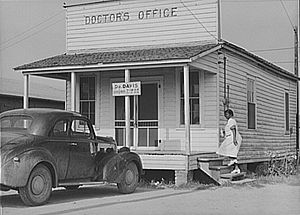
Image via Wikipedia

Image via Wikipedia
Ownership
Private practices are organized in a corporate model where the physicians are shareholders, or where one or more physicians own the practice and employ other physicians or providers. Private practices are almost exclusively for-profit. Physician practices are organized into corporations for the tax benefits as well as protecting the owners from liability judgments.
Hospitals can be for-profit, not-for-profit or government-owned. For-profit hospitals make up less than 20% of the total hospitals in the United States.
Financial Models
Private practice owners take a salary draw, split any receipts after all expenses are paid, and generally distribute receipts monthly or quarterly. This leaves very little at year end to be taxed through the corporation.
Hospitals that employ physicians typically guarantee a salary and offer an incentive plan where the physicians earn more for seeing more patients and/or being more productive based on work Relative Value Units (wRVUs). Hospitals may or may not use a practice expense and revenue model to measure the margin.
Benefits of Managing a Private Practice
- You get to do everything, so if you like or want to learn about HR, marketing, finance, IT, contract negotiation, revenue cycle management, facility management, and lots of other stuff, you’ll get to do it in a private practice.
- You are the top position in the practice, so you get to put your imprint on the practice. You can often be more creative.
- Physicians can be very laid-back and practices can maintain a more relaxed, family-like atmosphere.
- Decision-making can be straightforward and swift, so you can help your practice to be nimble in response to news events, trends and new ideas. If your practice decides to become a concierge practice or stop or start taking a particular payer, so be it!
- You may find it easier to get a foot in the door and start your management career in a private practice as physicians don’t always hire managers using traditional means. A recommendation from another manager, a consultant or a physician may be enough to get you started.
Drawbacks of Managing a Private Practice
- You report to the physicians who may not have business expertise and may fight you on your well-founded recommendations.
- There is no internal career path – you’re at the top in the practice.
- Physicians will make less money every time a new non-revenue generating position is added or any time equipment needs to be replaced – expect them to be generally slow to respond to capital expenditure needs, especially if they cannot see that any new revenue will come from the expense.
- When physicians “eat what they kill”, taking home the dollars they personally earn less their expenses, they can be pitted against each other and have conflicting priorities.
- Your practice could be purchased by a hospital and you could find yourself out of a job, or your job radically changed.
Benefits of Managing a Hospital-Owned Practice
- You report to a management professional who should understand the business and be supportive of your well-founded recommendations.
- You will receive support from other hospital departments: the Human Resources department will screen, orient and provide benefit support to your staff; the Information Systems department will provide and maintain your practice management system, EMR system and other hardware and software; and the Accounting department will pay the bills and write the payroll.
- You may be able to climb the career ladder and manage multiple practices, or become the Vice President of Physician Practices, or the COO, CFO or CEO of the hospital.
- You will get to interact with managers of other departments and broaden your hospital knowledge and understanding of the care continuum.
- You can learn a lot from the process of preparing for and living through a JCAHO (a.k.a. “The Joint Commission”) visit.
Drawbacks of Managing a Hospital-Owned Practice
- Hospitals use different terminology for charges, adjustments and receipts and work on the accrual system instead of the cash system, which most private practices use. It takes time to understand and distinguishes the terminology and process differences.
- The entire system will be in a tizzy on a regular basis getting ready for a JCAHO (a.k.a. “The Joint Commission”) visit.
- You can expect to have much less autonomy in a hospital system and there may be more red tape involved in getting even simple requests filled.
- Hospital administration may find it difficult to relate to the perspective of the hourly staff and it could be frustrating to balance the needs of the staff and the needs of the organization.
- Because the hospital is the big-dollar earner, the needs of the clinics may be second, third or fourth down the line in importance.
What do you see as the benefits or drawbacks of your private practice or hospital practice job?

